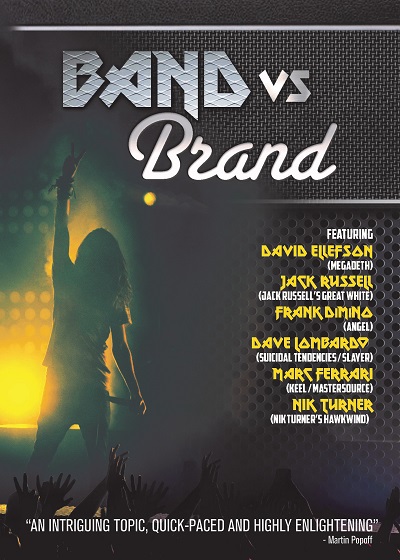The flood of rock music documentaries in the last few years has dug into those nooks and crannies, and turned over many, long-elusive stones. Bob Nalbandian’s documentary Band Vs Brand calls the music industry to task for its overt stunts and schemes to maintain or resuscitate well-known bands in the public eye. The 90-minute film, now on DVD from Cleopatra Entertainment, makes a viable case for how a group and their good name often exploit themselves (or are exploited) in a sometimes respectable and at other times desperate endeavor to keep the profits coming in — at virtually any and all costs.
To provide context, Nalbandian, who directed the L.A. Metal Scene series, brought in a myriad of industry types and musicians to weigh in. In the process, the film and its talking heads spend a considerable amount of time talking about how the music business — and rock and roll in particular — has dramatically changed.
In the midst of change, bands you’d have thought were relegated to the history bin have carried on. For them and anyone else still active, making records in an era of downloading and streaming is no longer the primary revenue pipeline. These days, bands have to rely on other means to keep the name alive — merchandising, licensing, and — if they’re still intact in one form or another — relentless, nonstop touring. Along the way, members quit, get fired, retire, die, or, fight to keep the “brand” in their court.
In the documentary, music executive David Tedds articulately outlines the history of branding in music, going back to Glen Miller and Tommy Dorsey, whose respective outfits carried on after their leaders passed, knowing full well that a band name is often more powerful than its individual members. Tedds goes on to cite rock bands who continue to perform, tour and even record with two, maybe one, or possibly no original members! To many fans, it doesn’t matter who’s in the band; it’s the songs and the music that’s most important.
In order for Nalbandian to drive home the point, he breaks down what it takes to keep a band’s brand in the marketplace. As both Megadeth’s David Ellefson and Keel’s Marc Ferrari, who wrote a book called Rock Star 101: A Rock Star’s Guide to Survival and Success in the Music Business, note, band logos and merchandise are integral to keeping the brand strong and the money coming in. To that effect, as the film reveals, KISS are the kings. Of course, none of that matters, as Tedds points out, if the proper rights to a name and image are not properly secured. That and song publishing make all the difference.
From there, a lively examination ensues about how bands have pushed on in the face of so many obstacles. In some cases, a split occurs and band members on both sides of the aisle fight over the name. This has resulted in situations where we end up with two bands called Great White, Ratt, L.A. Guns, and Yes. This doesn’t always work out so well. Pat Gesualdo, who runs The Hall of Heavy Metal History, believes two bands with the same name “waters down the brand.”
In another sequence, it’s pointed out how certain bands cannot go on without key members, which can affect the brand’s sustainability. There are exceptions. Foreigner, widely considered “faceless” before MTV came along, still packs amphitheaters despite the absence of original lead singer Lou Gramm and short, sporadic walk-on appearances from founding guitarist Mick Jones. In light of unique circumstances surrounding a particular group, everyone seems to agree that all original members in a band is a major selling point. Demand and money has brought many dormant and decimated bands back to life.
Demand has also lead to other brand-enhancing components like tribute bands and holograms. While both Neeley of the Classic Metal Show and Dio Disciples bassist Bjorn Englen agree that holograms can not replace the “real thing,” they do say it allows younger fans who missed out to experience what a deceased legend was like on stage. Wendy Dio says she wept when she saw the hologram of her husband Ronnie James Dio in action.
Clearly, all of the pieces of puzzle point to a bygone era that most everyone in Band Vs Brand acknowledges. Now that it’s become more essential that bands tour instead of recording, singer Frank Dimino of Angel comments on how fans used to come to shows wanting to hear new music. These days, he says, all they want to hear are the old hits. Regardless, keeping the band on the road is imperative to the bottom line, even as the stadiums and arenas have given way to smaller venues, fairs, casinos, and the occasional music-themed cruise.
In a landscape where integrity goes out the window; where the Internet and technology have stymied creation, artistic freedom, and mystique in favor of expedience, convenience, accessibility, and ultimately disposability; where time and progress have turned the tables on how a rock and roll band makes its way through the mire of 21st century muck — Band Vs Brand reinforces the notion that success is fleeting, while the business part of music often leads to deceit, greed, victimization, and the struggle to keep the band and the brand at the forefront of profitability. A strange and confounding state of affairs to be sure.
~ Shawn Perry




















